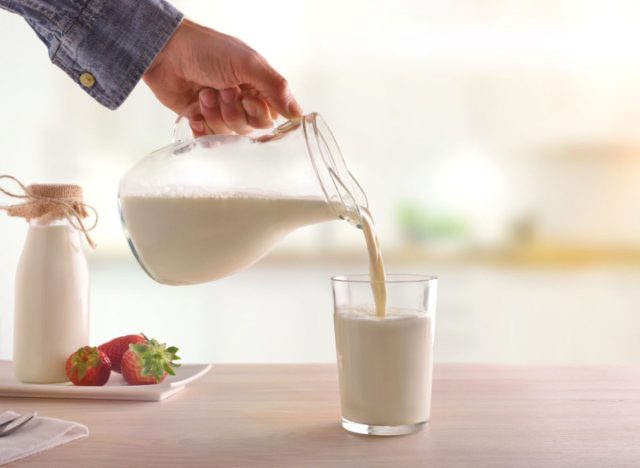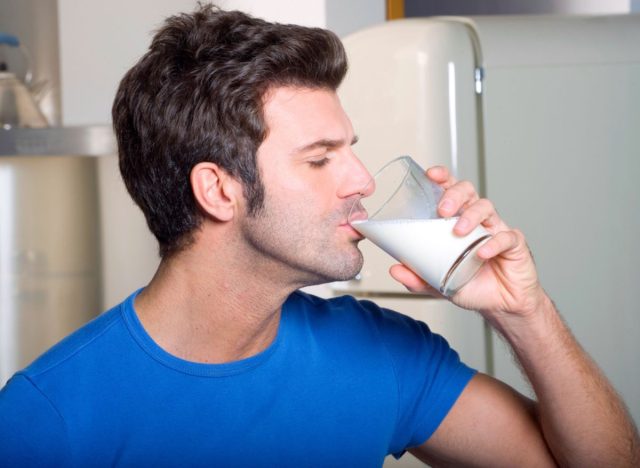The #1 Worst Drink for Prostate Cancer, New Study Suggests — Eat This Not That
It’s hard to believe, but the American Cancer Society (ACS) estimates roughly one in eight American men will be diagnosed with prostate cancer. Besides skin cancer, prostate cancer is the most diagnosed cancer among U.S. males and the second leading cause of cancer-related death among American men.
For just 2022 alone, the ACS predicts around 268,490 new prostate cancer diagnoses and 34,500 new deaths related to prostate cancer.
Frustratingly, modern medicine still can’t say for sure exactly what causes prostate cancer. Just like any other form of the disease, prostate cancer develops on the cellular level due to DNA changes and mutations. Some of these gene mutations are inherited, but many aren’t. In fact, the ACS tells us that most prostate cancer-related gene mutations seen in men are not inherited but acquired at some point during patients’ lives.
So, what are some identified external risk factors that may make a man more likely to develop prostate cancer? To start, age. Just about 60% of all prostate cancer diagnoses are among men older than 65.
Another possible risk factor is obesity. Some research has found that abdominal obesity is associated with a more aggressive form of prostate cancer. An unexpected factor could also be being a widower. One study even reported that widowed men are more likely to develop an advanced form of prostate cancer.
Now, new research conducted at Loma Linda University and published in the American Journal of Clinical Nutrition has identified a potential new major dietary risk factor tied to prostate cancer. Read on to learn more!
More milk may spell prostate trouble

There’s a lot to like about milk. It’s absolutely chock-full of essential vitamins and minerals, great for bone health, and packs a powerful protein punch to boot. This new study’s findings, however, indicate that drinking milk is associated with a greater risk of prostate cancer.
Study authors report men with a high usual intake of dairy milk face a significantly elevated risk of prostate cancer in comparison to other men drinking less milk. More specifically, the research found that men drinking about 430 grams of dairy daily (1.75 cups of milk) showed a full 25% greater risk of prostate cancer than other men drinking less milk on a daily basis (about a half a cup weekly). Prostate cancer risk among daily milk drinkers was even higher when compared to men avoiding dairy altogether.
Calcium has been linked to prostate cancer in the past, and dairy products like milk contain tons of calcium. Importantly, though, the research team says they observed absolutely no correlations between increased prostate cancer risk and ingestion of non-dairy calcium. In other words, while it’s clear that something in milk is linked to prostate cancer development – it isn’t just calcium.
“Our findings add important weight to other evidence associating dairy products, rather than non-dairy calcium, as a modifiable risk factor for prostate cancer,” says Gary Fraser, MBChB, PhD, the study’s principal investigator and professor at Loma Linda University School of Medicine and School of Public Health, in a press release.
Interestingly, no associations were seen between prostate cancer risk and intake of both cheese and yogurt.
Prostate cancer risk plateaus around 150 grams of milk daily
Study authors stress that their work did not find that prostate cancer risk increases indefinitely as more milk is ingested. Risk increases appear to level off around two-thirds of a cup of milk daily.
“Most of the continuing increase in risk is done with by the time you get to 150 grams, about two-thirds of a cup of milk per day,” Dr. Fraser explains. “It’s almost as if some biological or biochemical pathway is saturated at about two-thirds of a cup of milk per day.”
Solving the milk mystery

As touched on earlier, this study makes a strong case that calcium alone is not responsible for the association between prostate cancer and milk. So, what’s going on here?
“One interpretation is that dairy foods, or some closely associated unknown risk factor, are causally related to the risk of prostate cancer,” the study reads.
Dr. Fraser theorizes that the sex hormones found in dairy milk may be involved. Most (up to 75%) lactating dairy cows are pregnant, and prostate cancer just happens to be a hormone-responsive cancer. Moreover, prior research has found that ingesting dairy and other animal proteins is linked to higher levels of a specific hormone in the blood (IGF-1), and IGF-1 is believed to support the growth of certain cancers, including prostate cancer.
Milk is also linked to breast cancer
This work pairs well with an earlier study conducted at LLU. That project found that dairy milk ingestion is associated with greater breast cancer risk in women.
“The parallels between our breast cancer in women paper a year ago and this paper relating to men,…
Read More: The #1 Worst Drink for Prostate Cancer, New Study Suggests — Eat This Not That

